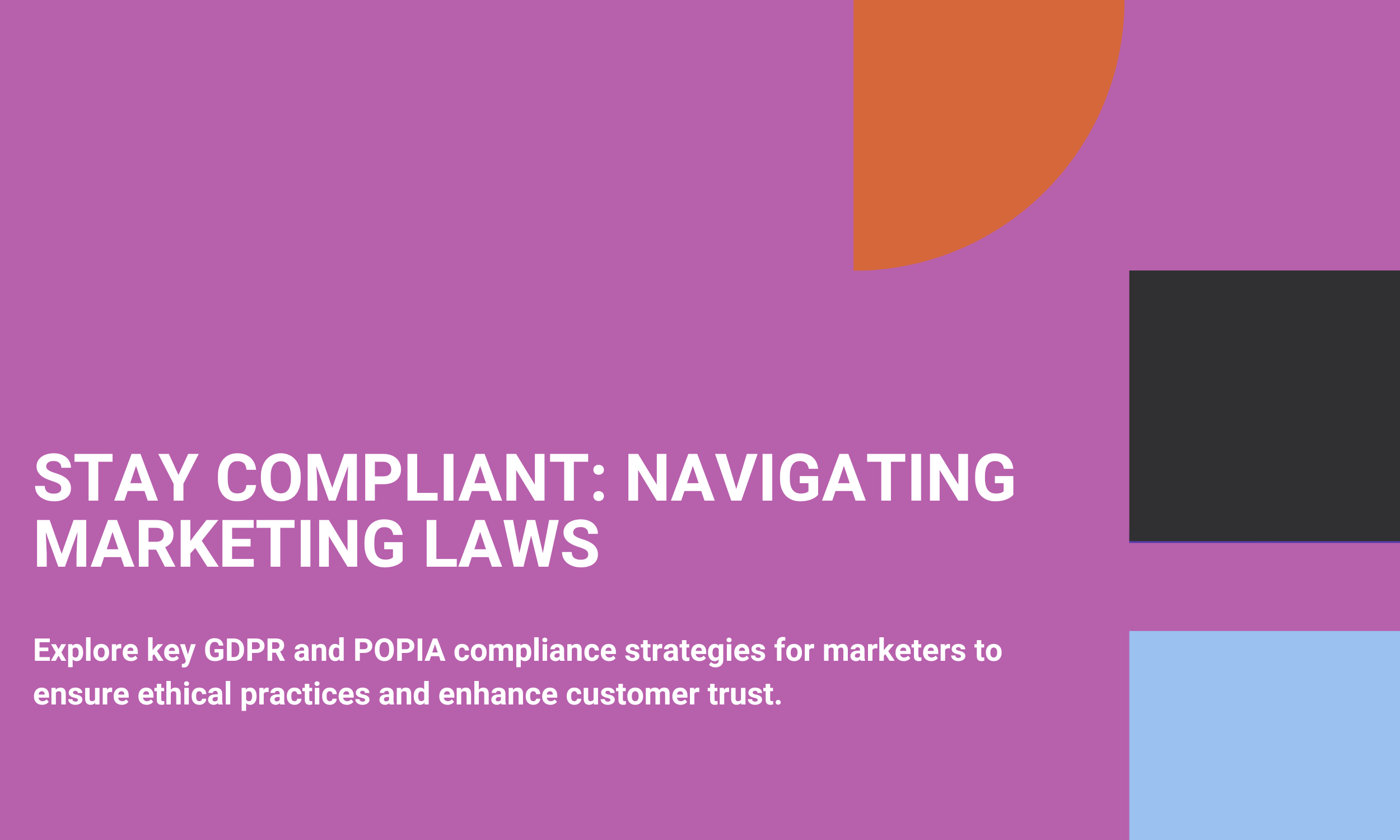Services List
Understanding and adhering to the various legal frameworks governing data privacy and usage is crucial. This article explores two significant pieces of legislation: the General Data Protection Regulation (GDPR) in Europe and the Protection of Personal Information Act (POPIA) in South Africa. Both regulations are vital for marketers aiming to operate lawfully and ethically in these regions.

Covered in this article
Understanding GDPR
Navigating POPIA
Best Practices for Compliance
An Overview of Marketing Compliance
FAQs About Marketing Compliance
Understanding GDPR
The General Data Protection Regulation (GDPR), which came into effect in May 2018, is a comprehensive data protection law that imposes strict rules on collecting, storing, and managing personal information of individuals within the EU. Here are the key requirements and how they impact marketing practices:
Key Requirements
- Consent: GDPR emphasizes the need for explicit and informed consent before collecting personal data. Marketers must ensure that consent is freely given, specific, informed, and unambiguous.
- Right to Access and Erase: Individuals have the right to access their personal data and can request that their data be erased (the "right to be forgotten").
- Data Portability: Individuals can receive their personal data in a structured, commonly used format, and have the right to transmit that data to another controller.
- Privacy by Design: This principle requires that data protection measures are integrated into the development of business processes and systems.
Marketing Implications
- Opt-in Strategies: Marketers must design opt-in strategies that comply with GDPR's consent requirements. This includes clear communication about the purpose of data collection and the provision of a straightforward mechanism to withdraw consent.
- Data Management Policies: Organisations need robust data management policies and systems to ensure compliance, particularly concerning data access, rectification, and deletion requests.
Navigating POPIA
The Protection of Personal Information Act (POPIA), which began to be enforced in July 2021, is South Africa's equivalent to GDPR. It governs how personal information must be processed, providing individuals with rights over their data while promoting transparency and accountability. Here are the critical aspects of POPIA relevant to marketers:
Key Requirements
- Accountability: Responsible parties are accountable for data processing and must comply with the POPIA’s conditions.
- Processing Limitation: Personal data should be collected directly from the data subject, and the collection must be limited to what is necessary for a specific purpose.
- Purpose Specification: Data should be collected for a defined, explicitly stated, and lawful purpose related to a function or activity of the data collector.
Marketing Implications
- Direct Marketing: POPIA stipulates that direct marketing using unsolicited electronic communications can only be carried out if the data subject has given their consent.
- Impact on CRM: Customer Relationship Management (CRM) systems must be adapted to ensure that they capture and process customer data in line with POPIA’s requirements.
Best Practices for Compliance
To navigate these regulations effectively, marketers can adopt the following best practices:
- Educate Your Team: Ensure that your marketing team is aware of both GDPR and POPIA. Regular training sessions will help maintain a high level of data protection awareness.
- Audit Your Data: Regularly audit your data collection and processing activities to ensure compliance. Identify any gaps and address them promptly.
- Enhance Security Measures: Implement robust security measures to protect personal data against unauthorised access or breaches.
- Develop Transparent Policies: Create clear, accessible privacy policies that outline how you collect, use, and manage personal data.
An Overview of Marketing Compliance
Understanding and complying with GDPR and POPIA is not just about legal compliance; it's also about building trust with your customers. By respecting their privacy and safeguarding their personal information, you reinforce your reputation as a trustworthy brand. For marketers at Velocity, adherence to these regulations is paramount. Not only does it prevent costly penalties, but it also aligns with our commitment to ethical marketing practices.
By staying informed and proactive, marketers can navigate these legal waters effectively, ensuring that their marketing strategies are effective and compliant. This, in turn, fosters a culture of trust and respect with customers, which is crucial in today's digital age. For further guidance on implementing these practices, connect with Velocity's experts today.
FAQs About Marketing Compliance
1. What is GDPR?
The General Data Protection Regulation (GDPR) is a legal framework that sets guidelines for the collection and processing of personal information from individuals who live in the European Union (EU).
2. How does GDPR affect marketing activities?
GDPR impacts marketing by enforcing stricter consent laws for data collection, requiring that individuals opt-in to marketing communications and have the right to access, rectify, or erase their data at any time.
3. What is POPIA?
The Protection of Personal Information Act (POPIA) is South Africa’s data protection law that governs the processing of personal information, ensuring that it is done lawfully, minimally, and securely.
4. Are there specific consent requirements under POPIA for direct marketing?
Yes, under POPIA, direct marketing via unsolicited electronic communications can only be carried out if the recipient has given explicit consent, and they must be offered the option to opt out of such communications in every message sent.
5. What are the penalties for non-compliance with GDPR and POPIA?
Non-compliance with GDPR can result in fines up to €20 million or 4% of annual global turnover, whichever is greater. POPIA also imposes hefty fines and even prison sentences for severe breaches.
6. How can organisations ensure compliance with both GDPR and POPIA?
Organisations can ensure compliance by regularly training their staff, auditing data processing activities, implementing robust security measures, and maintaining transparent data use policies.
7. Can personal data collected under one regulation be used in regions governed by another?
Personal data collected in compliance with GDPR or POPIA should not be used in other regions without ensuring that such use complies with local laws applicable in those regions.



